“Why couldn’t the police shoot the knife out of that guys hand? Why did they have to kill him?”
“Why did they pile on top of him with five cops? Poor guy got crushed! Police brutality!”
“Why did you hit him first? He was only yelling,he didn’t even touch you!”
“Why did he hit me? All I did was say that he’s an idiot!”
These are just a few examples of the kind of questions I have been asked about self-defense and violence over the years. As a rule, the people asking them either have very limited (often none at all) first-hand experience with violence or only encountered it as a bystander. The mere act of asking the question betrays their fundamental lack of information and experience on the subject. Usually, it means they really don’t know what they are talking about.
If you read this last sentence, get offended and start howling at the screen, ready to drink my blood, then let me answer those questions for you first:
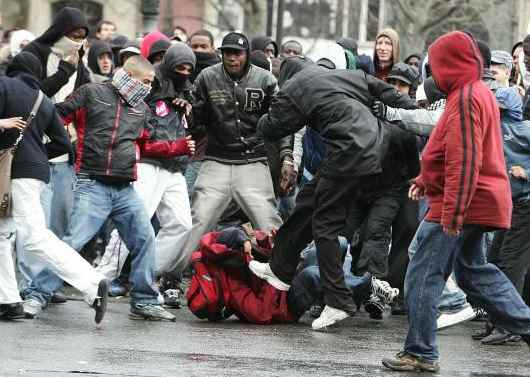
#1: “Shoot him in the hand to disarm him!”
Shooting a knife out of somebody’s hand only works in the movies. It is next to impossible for the average police officer to pull this off, it’s just too difficult. If you don’t believe me, go to the range and try it. Then, factor in adrenal stress, fear, having to make a split-second decision to take that shot, the bad guy not standing still like a paper target, etc. See what I mean?
Also, the officer is responsible for that bullet. If he misses (as he likely will with such an impossible shot) and hits an innocent bystander, he’s liable. So by default, he has a vested interest to make sure every shot hits the bad guy. Aiming for the larger target that is center mass (the torso) makes a whole lot more sense and is actually possible, given enough training.
If your response is that officers need more training, then I agree. Not because it will teach them to shoot the knife out of an attacker’s hands, but because they are typically under-trained as is. Go ask a LEO how much firearms training he gets from the PD every year (get ready to weep…). Not what he does on his own time and dime, but as a part of his ongoing training. Then, go find out how much that costs. Then, figure out how much extra training the officers would ideally receive to conform to whatever standard you feel is needed. Tally up that sum times the number of officers. It’ll be a pretty penny, even in small departments.
Final questions: are you prepared to pay extra taxes to fund this? If yes, awesome; you are putting your money where your mouth is and I applaud you. If not, fine, but which departments should get their budgets cut to free up those needed funds?
In other words, it’s easy to say the police need more training. It’s another matter making it happen.
A final consideration: bullets don’t always work like in the movies. How many bullets do you think it takes to kill somebody? 1 or two? 5 or 6 would do it, right? Surely 10-15 or more would be enough? OK, what if I tell you that sometimes even 21 bullets isn’t enough to do the job? Guns are not magic wands that make problems go away with a flick of the wrist.
Real violence, including the use of firearms, is unpredictable and chaotic.
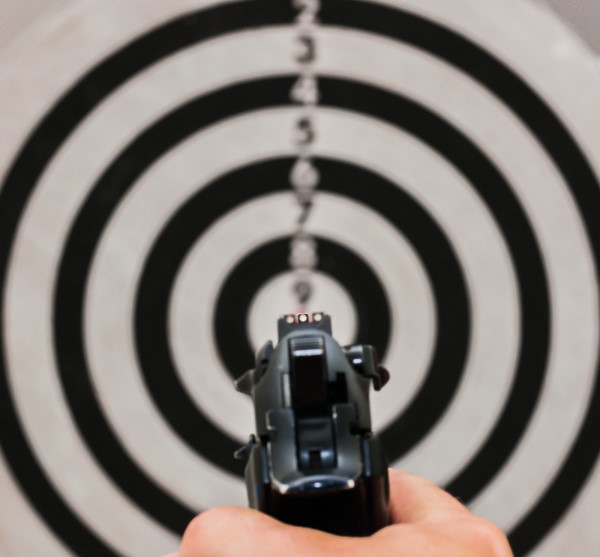
#2: “Why go five against one? Cops are cowards!”
Arresting people without hurting them is extremely difficult when they actively and violently resist. Remember how you had trouble controlling your 7-year old when he threw a temper tantrum and was kicking and screaming all over the store? How easy was it to hold him still without hurting him? Or to make him come along peacefully? Right… You could have slapped him over the head so hard he would have calmed down instantly but that would mean hurting your child and you don’t want that. You could have asked a couple other adults to each grab a limb to lift him up and out of there. That would have worked, right?
It is exactly the same for the police, but multiplied in difficulty and danger: an adult has a lot more physical strength than that kid and can injure both the officer and himself in the process of resisting arrest. That is why officers often use their combined weight to subdue somebody. It looks overly violent to the layperson but the alternative is an officer going one-on-one with a violent aggressor. That’s a recipe for injuries and deaths on both sides.
If you think arresting somebody is easy and the officer should just slap the guy in a control hold, then you really haven’t fought somebody trying to either hurt you or get away. It’s just not going to happen. The only alternative for the officer would be to use an elevated level of force, like pepper spray, his baton or firearm. And then you’d be angry at him for being so violent… Do some officers go overboard? Yes, 100%. When they do, they deserve to be punished to the full extent of the law. But that doesn’t mean the principle of numeric superiority should be discarded, on the contrary.
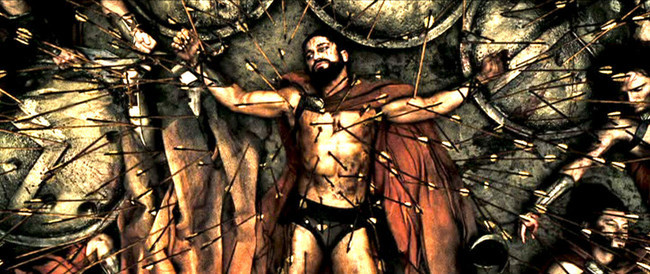
#3: “Why did you hit him?! He didn’t do nuthing!!!”
When somebody yells at you and is increasingly aggressive, you have to make a judgment call: can I get away or not? If you can run away, then you probably should. It’s both the smart thing to do (avoid the fight) and in many cases your legal obligation (read up on your self-defense laws, it’s all in there.) If you are in a situation in which running is not an option, then you do not have to wait until the guy knocks you half-unconscious before taking action. Most countries have self-defense laws that don’t say you have to eat that punch before you can strike your aggressor, neither is it good tactics:
In the movies, the hero takes a beating and rallies to overcome the bad guy. In real life, the guy who lands the first punch usually wins the fight. And the guy who attacks first usually lands that first punch. So if somebody is increasingly hostile towards you, even if he is only yelling and not physically harming you just yet, the situation might warrant using a pre-emptive strike to stop him from escalating it further.
I use “might” because as with all things, this isn’t black or white. There are more factors to take into account than this, but the principle stands. Pre-emptive striking is a valid tool against violence, providing it is used in the right context.
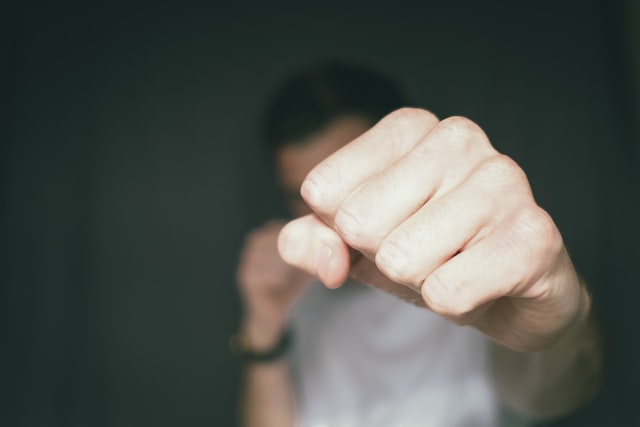
#4: “Why did he hit me? I only said was he was an idiot!”
If in your world view, you can say anything to anybody without repercussions, then good for you. It’s naive and perhaps even suicidal, but it is your right to think that way. Here’s the thing though: being verbally aggressive is often the precursor to violent behavior. It is one of the ways in which people psyche themselves up to start swinging punches, while also testing if you will stand up for yourself or not. Meaning: can they get away with it?If you don’t react to somebody screaming in your face like a raving maniac, especially when allowing them to close the distance, then you just showed them you have no idea about how sucker punches work…
The point is that just because you don’t punch somebody just yet, doesn’t mean you are not acting aggressively when you called him a “Goddamned fucking idiot!!!!” You might feel justified, you might feel righteous in saying so, but you are still displaying aggression, even if you have no real intention of turning that aggression into physical violence and just want to scare the person off. Guess what: some people will take you seriously anyway and assume you’ll go to the violence stage in the next couple of seconds. So they don’t wait for your punch to come and hit you first.
They don’t know you, they don’t know if you’ll lash out or not. They’ll just assume you will eventually strike, given your aggressive verbal tirade. What’s more, legally speaking, they will be likely able to present a strong case in their defense because if you are the only one screaming obscenities, you are the aggressor, not they…
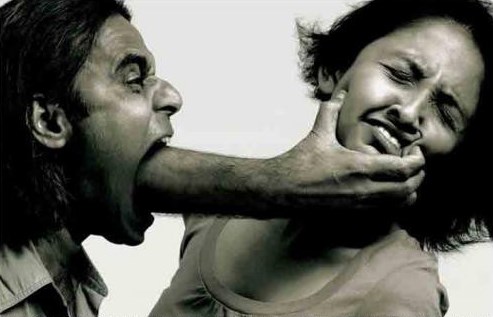
Conclusion
As you can see, there are reasons why these four questions demonstrate a lack of experience and understanding on the topic of violence.
If you still aren’t convinced, then the next logical step is to seek out more information to debunk my replies and confirm your own arguments. To do that, you need to go to the right sources. In this case, that means people who have actual experience with violence. Not the theorists, but those who are face-to-face with it in their daily lives: police officers, soldiers, EMTs, security officers, bouncers, etc. Whatever your feelings about those kinds of professions, you cannot deny that they have far more actual experience on this subject than you. Go ask them these four questions and see how they reply…
I do ask one thing though: be honest with yourself.
Be honest in admitting that they have relevant experience with a subject that is primarily theoretical for you. So it would behoove you to consider their responses as likely more accurate than your personal opinions. Having an opinion is great, but having an informed opinion is better.
There is nothing wrong with that, by the way. It’s a good thing that you haven’t been exposed to violence all that much. I am not promoting you go out and be violent to learn what it is really all about. What I am promoting is that the majority of modern society has a flawed understanding of the topic. Personally, I blame politicians and Hollywood for creating a false image of it, but that’s another discussion.
What I am also not promoting is a “kill or be killed” attitude. On the contrary, the most practical and useful self-defense tips have nothing to do with punching the other guy’s lights out. But before you can form an opinion on violence and how to handle it, you need to understand the problem first. Doing so means confronting your own biases and views on this subject with what it is actually like in real life.
That’s scary and uncomfortable.
But it’s also the only way to get a meaningful answer to the question:
“What is violence really like and how do I avoid it?”
With that, I wish you good luck in your quest for information and hope this article helps you on your way. If you still want more information, I can recommend these excellent books on the topic of violence:
Violence Analysis instructional videos: I have well over 80 videos in which I break down into detail real-life violence situations caught on camera. You’ll learn what to look out for, what you could have done to prevent the situation, and much more. Each month, another video is added.
In the Name of Self-Defense: What it costs. When it’s worth it by Marc MacYoung.
Meditations on Violence: A Comparison of Martial Arts Training & Real World Violence by Rory Miller


Andrew H says
As a retired cop I recall many instances of ignorance of the public when I had to arrest somebody who was combative. I got a complaint of police brutality when three of us had to knock a guy down who was attempting to draw a firearm and we were really fighting for our lives. One officer got shot in the face in another incident and the bad guy was being physically restrained by another officer trying to get him on the ground and the gun out of his hand. A K9 was loosed and we got a complaint of PB by an Official on another Dept. Just one of dozens of wrong headed interference by well meaning but stupid bystanders.
George Joy says
Great article. On #4, some people won’t and don’t tolerate people talking to them in a disrespectful manner, so getting a smack in the mouth from them isn’t because they consider the name caller aggressive but more to do with a lack of respect. Unfortunately, many Karen’s and Kevin’s apparently failed to learn this lesson growing up so when they run their mouths to someone who is not constrained by the mores of polite society, it often ends badly for them.
Michael Valgos says
I am a Marine for life and I was a police reserve with 2 brothers retiring as police officers and I know that it does not make any difference how much experience that you may have all situations are different and unless you have esp you will not know how each individual will react So all 4 of these ideas are for Monday morning quarterbacks The reality is that you do not have time to think about how the situation will play out You will have to use your training to help you decide what you must do to save lives including your own A judge decided that California can own a semi automatic rifle because there were 15 times as many fatalities with knives being used than the semi automatic rifles So a knife will kill you just the same as a firearm
Dave says
Damn straight. From kindergarten to adulthood (so to speak) people have learned that there are no consequences to beaking off and getting into someone else’s personal space, and that if they DO get verbally abusive and someone retaliates they can sue for enough money to live comfortably on their settlement and disability or unemployment for years.
Justice? What justice? What will silence the problem?
Peace? What peace?! Who needs to be silenced or shamed into submission and compliance?!
Education?! What education?!! We’ve given control of public education to Marxists for 30 years.
The media, social networking, and mob mentality leave no place for common sense, sense of community or citizenship anymore.
The ungrateful and entitled reign.
For now.
The pendulum will swing again and karma’s a bitch!
Ken says
I think this is one of the most honest articles I have read….ever. well done, u speak for so many without a voice, sounds overly dramatic but it’s true. 33 years of confrontation and not always winning